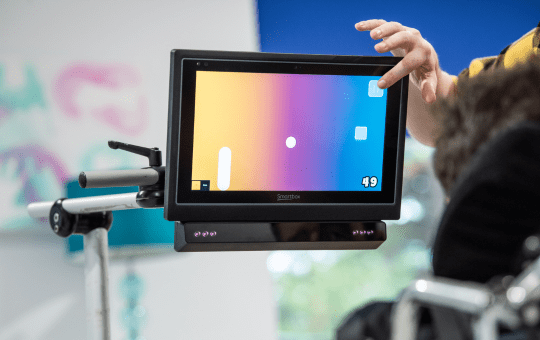Using Look Lab to support communication and eye gaze skills
Look Lab is a software package designed for people who use eye gaze, which is a way of accessing and controlling a computer or communication device using your eyes. It features 38 accessible games and activities for practising eye gaze skills in a relaxed and enjoyable way. The software was developed in consultation with SEN teachers and professionals, with the aim of helping people both get started with eye gaze and continue to challenge their skills as they progress.
How can you use Look Lab to develop eye gaze skills in the classroom?
There are a broad range of activities in Look Lab, many of which can be incorporated across the school day. These include puzzle games, mindfulness exercises and creative outlets like musical and art tools.
Different activities will encourage students to engage with the screen in different ways. Here are 12 eye gaze skills that the software can support you to develop: exploring the screen, cause and effect, tracking objects, sustained attention, dwelling, choice making, reacting to sudden changes, memory, horizontal control, vertical control, precision and problem solving.
The activities have varying levels of difficulty and are designed to be a pressure-free way for students of all abilities to practice using eye gaze. Easy mode allows you to explore the activities at your own pace, free from the fear of losing or running out of time. Standard mode introduces a competitive edge, where activities increase in difficulty and include time constraints and limits attempts to win.
Using Look Lab to support communication
The practical skills you can develop using Look Lab are beneficial for everyday eye gaze use, as well as for learning to communicate intentionally. Many of the activities encourage you to look at a target and dwell, the same way you would look at cells on a screen to select a word or phrase. You explore the screen in the activities just like you would when you are using your eyes to explore a vocabulary, to see all the language that’s available and make intentional selections.
As well as supporting the development of essential eye gaze skills, Look Lab can be great for creating communication opportunities – it’s something to talk about! “What did you think about that activity?”, “Was it fun?”. Thinking about how we could model language in a symbol AAC vocabulary like Super Core, you could say “What do you think?”, “did you like it?”, “do you want more”, “let’s do it again”.
For users of Grid 3 communication software, you can easily switch between Look Lab and an AAC vocabularies like Super Core. Look Lab gives eye gaze users the autonomy to do this themselves, meaning they can chat about the activities and initiate conversations whenever they want to. They can also select activities and modify settings independently, giving AAC users the power to curate their own experiences, engage in discussions and advocate for the activities and tasks they desire.
To really embed communication into Look Lab, a readymade Look Lab companion grid set is available for Grid 3 users, with a ‘Simple Chat’ grid. The Simple Chat grid encourages users to provide feedback in as much or as little detail as they would like in-between or after activities. They may express likes, dislikes, make decisions on which activity they would like to try next, how their eye gaze performed and if the difficulty needs revising. You can also add in links to your preferred AAC vocabulary.
In this video, Trevor (Product Manager for Look Lab) demonstrates how you can use the Look Lab with Grid 3 communication software.
Track progress with the Look Lab workbook
If you are looking for a way to track students’ progress with Look Lab, the workbook is an ideal companion for your classroom – with sections to track and record the long-term development of eye gaze and communication skills.
A ‘Skills Checklist’ gives you an overview of the different skills each game or activity targets, so you want to focus on developing a specific skill you can choose one of the suggested games or activities.
You will also find individual worksheets for evaluating a student’s performance in the different activities, the skills it targets and the corresponding in-game objectives. There is a heat map analysis tool in the software which you can use to evaluate where the user has looked on the screen.

Look Lab is created by Smartbox. Visit the Look Lab webpage for more information and to download a free trial of the software.
Useful links:
> Watch the recording Thursday Thirty session with Kim
> Watch the video – An introduction to Look Lab with James
> Watch the video – Exploring Look Lab activities with Carrys





